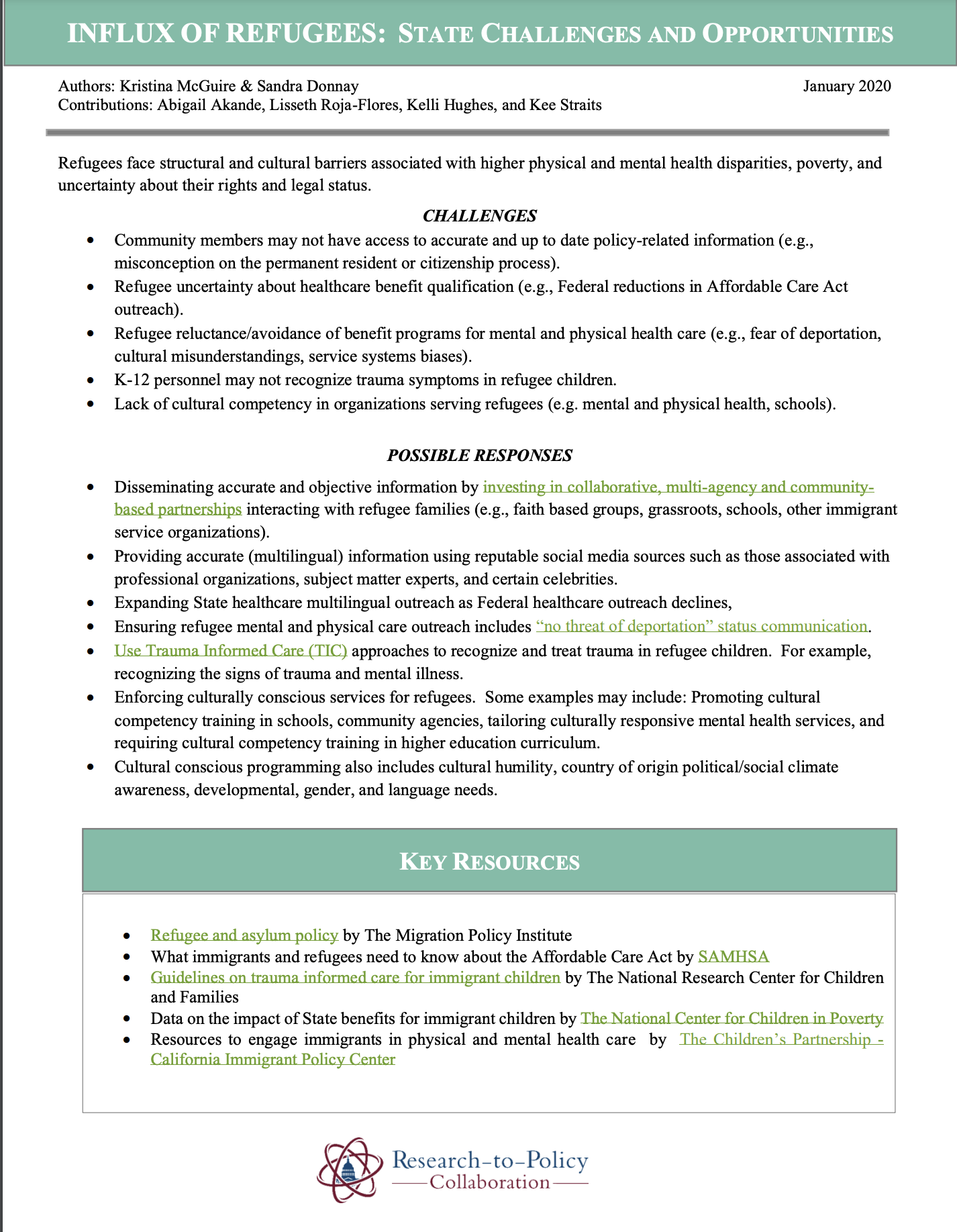
Refugees face structural and cultural barriers associated with higher physical and mental health disparities, poverty, and uncertainty about their rights and legal status.
Challenges
- Community members may not have access to accurate and up to date policy-related information (e.g., misconception on the permanent resident or citizenship process).
- Refugee uncertainty about healthcare benefit qualification (e.g., Federal reductions in Affordable Care Act outreach).
- Refugee reluctance/avoidance of benefit programs for mental and physical health care (e.g., fear of deportation, cultural misunderstandings, service systems biases).
- K-12 personnel may not recognize trauma symptoms in refugee children.
- Lack of cultural competency in organizations serving refugees (e.g. mental and physical health, schools).
Possible Responses
- Disseminating accurate and objective information by investing in collaborative, multi-agency and community- based partnerships interacting with refugee families (e.g., faith based groups, grassroots, schools, other immigrant service organizations).
- Providing accurate (multilingual) information using reputable social media sources such as those associated with professional organizations, subject matter experts, and certain celebrities.
- Expanding State healthcare multilingual outreach as Federal healthcare outreach declines,
- Ensuring refugee mental and physical care outreach includes “no threat of deportation” status communication.
- Use Trauma Informed Care (TIC) approaches to recognize and treat trauma in refugee children. For example, recognizing the signs of trauma and mental illness.
- Enforcing culturally conscious services for refugees. Some examples may include: Promoting cultural competency training in schools, community agencies, tailoring culturally responsive mental health services, and requiring cultural competency training in higher education curriculum.
- Cultural conscious programming also includes cultural humility, country of origin political/social climate awareness, developmental, gender, and language needs.
Key Resources
- Refugee and asylum policy by The Migration Policy Institute
- What immigrants and refugees need to know about the Affordable Care Act by SAMHSA
- Guidelines on trauma informed care for immigrant children by The National Research Center for Children and Families
- Data on the impact of State benefits for immigrant children by The National Center for Children in Poverty
- Resources to engage immigrants in physical and mental health care by The Children’s Partnership – California Immigrant Policy Center
The Research-to-Policy Collaboration (RPC) works to bring together research professionals and public officials to support evidence-based policy. Please visit their website to learn more.
Key Information
RPC Website
Research-to-Policy Collaboration
More RPC Resources
RPC Resources
Publication DateJanuary 1, 2020
Topic Area(s)Community-Specific, Health, Economy and Entrepreneurship
Resource TypeWritten Briefs
Share This Page
Refugees face structural and cultural barriers associated with higher physical and mental health disparities, poverty, and uncertainty about their rights and legal status.
Challenges
- Community members may not have access to accurate and up to date policy-related information (e.g., misconception on the permanent resident or citizenship process).
- Refugee uncertainty about healthcare benefit qualification (e.g., Federal reductions in Affordable Care Act outreach).
- Refugee reluctance/avoidance of benefit programs for mental and physical health care (e.g., fear of deportation, cultural misunderstandings, service systems biases).
- K-12 personnel may not recognize trauma symptoms in refugee children.
- Lack of cultural competency in organizations serving refugees (e.g. mental and physical health, schools).
Possible Responses
- Disseminating accurate and objective information by investing in collaborative, multi-agency and community- based partnerships interacting with refugee families (e.g., faith based groups, grassroots, schools, other immigrant service organizations).
- Providing accurate (multilingual) information using reputable social media sources such as those associated with professional organizations, subject matter experts, and certain celebrities.
- Expanding State healthcare multilingual outreach as Federal healthcare outreach declines,
- Ensuring refugee mental and physical care outreach includes “no threat of deportation” status communication.
- Use Trauma Informed Care (TIC) approaches to recognize and treat trauma in refugee children. For example, recognizing the signs of trauma and mental illness.
- Enforcing culturally conscious services for refugees. Some examples may include: Promoting cultural competency training in schools, community agencies, tailoring culturally responsive mental health services, and requiring cultural competency training in higher education curriculum.
- Cultural conscious programming also includes cultural humility, country of origin political/social climate awareness, developmental, gender, and language needs.
Key Resources
- Refugee and asylum policy by The Migration Policy Institute
- What immigrants and refugees need to know about the Affordable Care Act by SAMHSA
- Guidelines on trauma informed care for immigrant children by The National Research Center for Children and Families
- Data on the impact of State benefits for immigrant children by The National Center for Children in Poverty
- Resources to engage immigrants in physical and mental health care by The Children’s Partnership – California Immigrant Policy Center
The Research-to-Policy Collaboration (RPC) works to bring together research professionals and public officials to support evidence-based policy. Please visit their website to learn more.

Key Information
RPC Website
Research-to-Policy Collaboration
More RPC Resources
RPC Resources
Publication DateJanuary 1, 2020
Topic Area(s)Community-Specific, Health, Economy and Entrepreneurship
Resource TypeWritten Briefs
Share This Page
LET’S STAY IN TOUCH
Join the Evidence-to-Impact Mailing List
Keep up to date with the latest resources, events, and news from the EIC.




